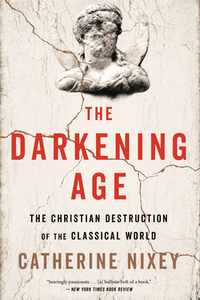Take a photo of a barcode or cover
265 reviews for:
The Darkening Age: The Christian Destruction of the Classical World
Catherine Nixey
265 reviews for:
The Darkening Age: The Christian Destruction of the Classical World
Catherine Nixey
Super interesting book focused on the transition of culture as Christianity became ascendant in the roman empire. I liked the use of primary sources and quotes.
informative
reflective
slow-paced
dark
reflective
slow-paced
This was really entertaining and engaging.
The commonly held Christian view is that Rome was overjoyed to become Christian, saved from silly, pagan beliefs by turning to the one, true god.
This book uses scraps of saved historical and philosophical writings to paint a different picture. Christians as a gang of brutal thugs, destroying classical art and writings as heresies and killing philosophers and intellectuals they saw as demonic.
Today we would regard them as religious extremists and terrorists.
Even the bits of ancient wisdom saved by monastic scholars had to align with Christian beliefs, as a result what they did save was paltry compared to what must have been.
In the end, emperor Justinian signed into law that all citizens must present themselves and their families for Christian baptism or be put to death.
Critics of this book call it one sided but I can’t help but feel that I’ve only heard the Christian side my whole life.
The commonly held Christian view is that Rome was overjoyed to become Christian, saved from silly, pagan beliefs by turning to the one, true god.
This book uses scraps of saved historical and philosophical writings to paint a different picture. Christians as a gang of brutal thugs, destroying classical art and writings as heresies and killing philosophers and intellectuals they saw as demonic.
Today we would regard them as religious extremists and terrorists.
Even the bits of ancient wisdom saved by monastic scholars had to align with Christian beliefs, as a result what they did save was paltry compared to what must have been.
In the end, emperor Justinian signed into law that all citizens must present themselves and their families for Christian baptism or be put to death.
Critics of this book call it one sided but I can’t help but feel that I’ve only heard the Christian side my whole life.
informative
reflective
slow-paced
3,5 ✨
Very good book to serve as an introduction and general reading of that time period. It was sometimes a big repetitive but its message got to the point: "The 'triumph' of Christianity was complete."
Very good book to serve as an introduction and general reading of that time period. It was sometimes a big repetitive but its message got to the point: "The 'triumph' of Christianity was complete."
This book shows how the Christians declined the classic era and took over. Yes, this book focuses more on the destruction and fear the Christians put on the pagans but it also shows how the Christians tried to erase history and forced their religion upon the Roman Empire.
A useful counter-argument to other, more hagiographic portraits of Early Christianity. But the author goes too far, presenting Christians as an unalloyed bad influence on all that was great in the classical world, ignoring or downplaying any counter-examples.
The writing style is that of a journalist, not an academic, which some may find more entertaining but I thought was distracting. Example: "In the middle of the baking August of AD 111, as his ship rounded the foot of the Peloponnese in suffocating heat, Pliny the Younger looked little like the diabolical Roman governor of legend." I mean, this is clear editorializing in the name of improving the readability. If you prefer that sort of thing, you'll like the book. If you're more interested in a critical examination of the ideas, this is not for you.
informative
fast-paced
Este libro es fantástico, y muy triste al mismo tiempo. Una narración ágil y fascinante de cómo el cristianismo pasó de ser una secta marginal de follacabras analfabetos a perseguir y destruir a las demás religiones y filosofías de Occidente.
Nixey ataca la idea de la cristianización tal y como la hemos conocido, fundamentalmente porque es una historia contada por el vencedor. Nada sorprendente, puesto que los cristianos eliminaron todas las narraciones alternativas. No fue un proceso gozosamente aceptado por todos los habitantes del imperio. Fue la misma opresión y violencia que sería durante mil y pico años después.
De todo el libro, un dato ilustra perfectamente lo dañino que fue el cristianismo. Sólo un 10% de las obras en griego nos han llegado. En latín, un 1% aproximadamente, ya que era más fácil de leer y censurar. Sin duda, el cristianismo y su odio por la inteligencia, el gozo, la alegría (la llamaban "la tiranía de la alegría") y todo lo que representa la vida, hizo más daño que las invasiones bárbaras. Quizá no fue la causa de la caída de Roma, pero desde luego fue un cáncer.
Nixey ataca la idea de la cristianización tal y como la hemos conocido, fundamentalmente porque es una historia contada por el vencedor. Nada sorprendente, puesto que los cristianos eliminaron todas las narraciones alternativas. No fue un proceso gozosamente aceptado por todos los habitantes del imperio. Fue la misma opresión y violencia que sería durante mil y pico años después.
De todo el libro, un dato ilustra perfectamente lo dañino que fue el cristianismo. Sólo un 10% de las obras en griego nos han llegado. En latín, un 1% aproximadamente, ya que era más fácil de leer y censurar. Sin duda, el cristianismo y su odio por la inteligencia, el gozo, la alegría (la llamaban "la tiranía de la alegría") y todo lo que representa la vida, hizo más daño que las invasiones bárbaras. Quizá no fue la causa de la caída de Roma, pero desde luego fue un cáncer.
adventurous
informative
slow-paced







